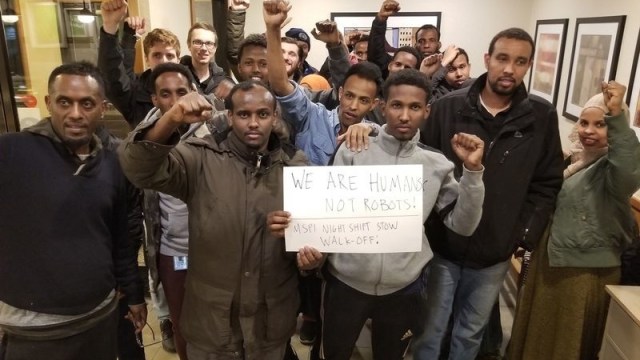White evangelicals are least likely to say U.S. should accept refugees

Harvey Meston / Staff
- A Pew Research Center survey found that only 25% of white evangelicals say the U.S. has a responsibility to accept refugees.
- Meanwhile, people with no religious affiliation were most likely to say the U.S. does have that responsibility.
- The results show the divide between the principles and practices of right-wing Christians in the U.S.
It might seem like non-religious people would be most likely to say the U.S. doesn’t have a responsibility to accept refugees. After all, nonbelievers don’t follow a unified doctrine that explicitly tells followers to offer love, shelter and compassion to foreigners — you know, like Christians do. For example, the Bible states:
Leviticus 19:34 — “The alien who resides with you shall be to you as the citizen among you; you shall love the foreigner as yourself, for you were foreign in the land of Egypt: I am the Lord your God.”
Matthew 25:35 — “I was hungry and you gave me food, I was thirsty and you gave me drink, I was a stranger and you welcomed me.”
Jeremiah 22:3 — “Thus says the Lord: Do justice and righteousness, and deliver from the hand of the oppressor him who has been robbed. And do no wrong or violence to the resident alien, the fatherless, and the widow, nor shed innocent blood in this place.”
Exodus 22:21 — “You shall not wrong or oppress a resident alien; for you were aliens in the land of Egypt.”
It’s not difficult to decipher the main moral message here: Be kind to foreigners. But that directive seems to be lost or ignored by a particular group of modern American Christians: white evangelicals.
A Pew Research Center survey found that only 25 percent of white evangelicals in the U.S. said that the U.S. has a responsibility to accept refugees into the country. The center first published the study last year, but recently tweeted a breakdown showing how answers vary along lines of race, age, education and religion.
“By more than two-to-one (68% to 25%), white evangelical Protestants say the U.S. does not have a responsibility to accept refugees,” the center wrote. “Other religious groups are more likely to say the U.S. does have this responsibility. And opinions among religiously unaffiliated adults are nearly the reverse of those of white evangelical Protestants: 65% say the U.S. has a responsibility to accept refugees into the country, while just 31% say it does not.”
Do these sentiments help explain support for recent anti-refugee policies in the U.S.? Or are these views, in some way, a product of the Trump Administration’s strategy of weaponizing the Bible and Christianity to push policy — such as when former Attorney General Jeff Sessions and former White House press secretary Sarah Sanders “appeared to use Romans 13 — a verse in which the Apostle Paul cautions an early Christian group against rising up against the Roman Empire — to argue that the Trump administration has the biblical authority to make its own rules, and that Christians have a duty to submit to them,” as Vox notes?
It’s hard to say which came first. After all, white evangelicals — many of them, at least — have a history of racism and xenophobia. But the Trump presidency is notable for receiving such strong support from white evangelicals and, more broadly, Christian nationalists. That support was undoubtedly pushed along by prominent evangelical leaders with ties to the president.
For example, take Paula White — President Donald Trump’s spiritual adviser and popular prosperity gospel preacher. Last year, White told the Christian Broadcasting Network that the government had “amazing” detention camps in which migrant children who’d been separated from their families were being held. She also tried to use the Bible to justify anti-immigration policies.
“I think so many people have taken biblical scriptures out of context on this, to say stuff like, ‘Well, Jesus was a refugee,'” White told the network, adding: “Yes, [Jesus] did live in Egypt for three-and-a-half years. But it was not illegal. If He had broken the law then He would have been sinful and He would not have been our Messiah.”
(To sum up her logic: Breaking the law is a sin, because the law is always right. Therefore, to be Christ-like, we should always follow the orders of the government, no matter what the order, no matter the president. Of course, this viewpoint is by no means endorsed by mainstream Christians, and it sounds far more totalitarian than American. After all, the U.S. would’ve never been founded if colonists hadn’t repeatedly broken British law. Does that mean the U.S. was founded on a sin?)
In any case, examples like this show how some evangelical leaders combine spurious logic with half-baked biblical notions to obfuscate a very simple message the Bible tells us: Be kind to foreigners. Of course, this doesn’t mean Christians are hypocrites unless they support a radical open-borders policy. But rather, it shows how some groups of right-wing Christians have for decades been drifting away from their source text — so far away that sometimes they seem completely unmoored to it.





